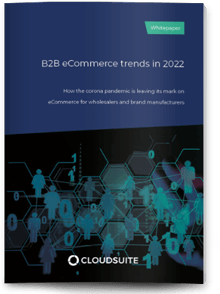One of the most important eCommerce trends of 2021 was the growing popularity of digital sales models in the b2b world. For example, a McKinsey study found that only 30 percent of business buyers now need to interact with a physical representative. Their preference is for digital remote purchasing.
Digital sales models are not only a dire necessity in the corona era: 88 percent of B2B sellers plan to keep them alive after the pandemic. More and more wholesalers and brand manufacturers are looking for ways to market their products and services online. This is how they often end up at marketplaces; a sales channel that is gaining popularity in this heyday for eCommerce. But is it smart to join an e-commerce trend such as the marketplace as a wholesaler or brand manufacturer?

Search by price or brand experience?
Many wholesalers and brand manufacturers struggle with the same question in the current business climate: should I invest all my time, money and energy in setting up and improving my own webshop or invest seriously in marketplaces?
While marketplaces can be useful additions to your total sales channel offering, they do little to strengthen your brand identity. According to many experts, "buyers will find everything in marketplaces except your brand." This is evident from the example of Amazon:
- 70% of Amazon searches do not include a brand name,
- Almost 90% of product views on Amazon are the result of no-brand searches and ads or merchandising without brand mention.
Marketplaces are great for price searches. But the so-called "value-driven buyers" (now about 40%) want products and brands that match their philosophy of life and beliefs about quality, the environment and social responsibility (sustainability, recyclability). And this group is also willing to pay extra for that.
In addition, modern consumers like to shop at independent, chain independent companies. The reasons for this are:
- Stimulate entrepreneurship (33%),
- Buy unique products (33%),
- Good customer service (31%).
The main reasons for buying from a "corporate" are:
- A good, broad and diverse product range (57%),
- Low prices (51%),
- Reliability (34%).
The alternative to marketplaces
Alternatives that ensure that you don't have to aim all digital arrows at marketplaces?
- Invest in offering a streamlined and perfect shopping experience through your own sales channels. You do this by focusing on integrations. Not only with your own systems, but also with the ERP system of your suppliers so that you can automate workflows more easily.
- Offering end-to-end solutions for product ranges in the form of one-stop shops. Paardekooper, a large distributor of packaging materials, expanded its range to a one-stop-shop for restaurants, snack bars and food markets. In addition to the paper coffee cup, Paardekooper now also supplies the milk and sugar for coffee, the coffee itself and plants and candles to decorate restaurants.
You can launch one-stop shops by creating creative partnerships. Consider, for example, wholesalers in fruit and vegetables that work together with meat suppliers to serve hotels and restaurants. Or furniture suppliers who join forces with companies that produce paint, wallpaper or home accessories. By personalizing all those services based on algorithms and analyzing customer information, you create successful alternatives to marketplaces.
- Investigate the possibility of opening new channels through a multishop eCommerce environment to reach new target groups. the acceleration of D2C allows wholesalers and brand manufacturers to sell their products and services directly to the end customer.
Marketplaces are an undeniable trend and a potentially useful addition to your other sales channels. Still, it's not a good idea to rely on it blindly, especially if you're trying to build your brand.

